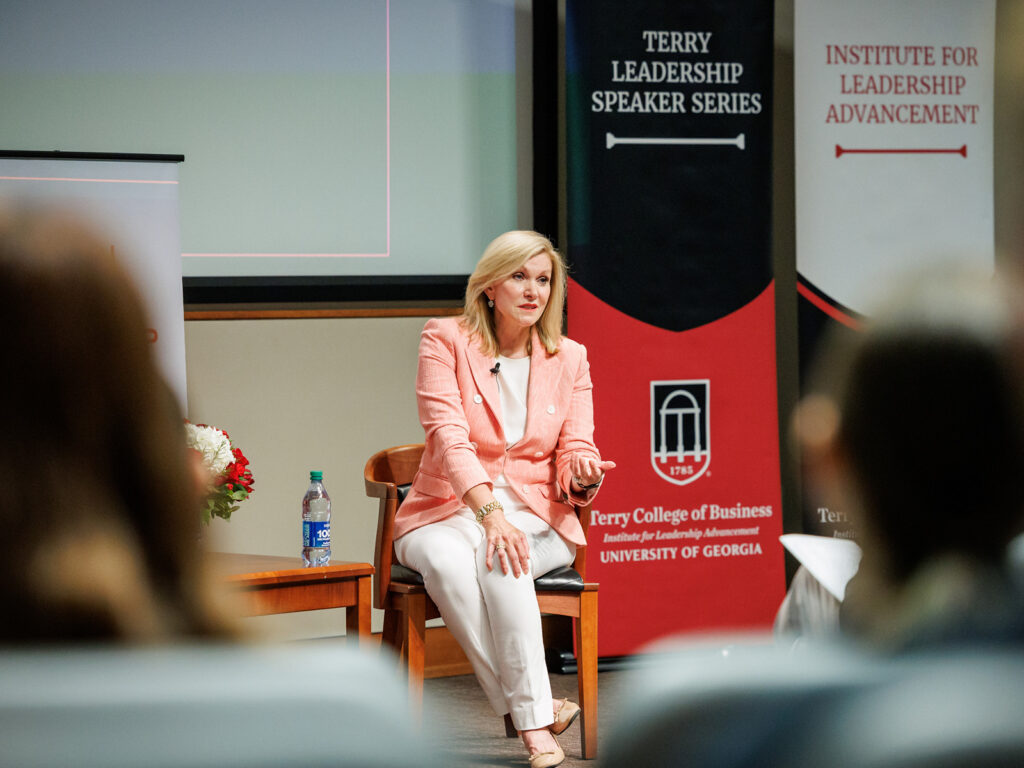Driving south on Interstate 85 into Atlanta, it’s hard to miss the gleaming 19-story Children’s Healthcare of Atlanta campus under construction.
When complete in Fall 2024, the campus will encompass 20 acres of green space and 2 million square feet of state-of-the-art hospital facilities. But when Children’s Healthcare of Atlanta CEO Donna Hyland thinks about the $2.2 billion project, she doesn’t think about the costs, the generosity of the donors making it happen, or even how it will change the skyline. She thinks about kids like Arielle.
Arielle was eight when she was severely injured in a car accident and taken to Children’s Healthcare of Atlanta for surgery to repair severe head and neck trauma. Her mom didn’t know if she would survive, much less walk again.
But after surgery and three years of hard work and rehabilitation at Children’s Healthcare of Atlanta, she’s almost fully recovered.
“We have thousands of those stories,” Hyland recently told a crowd of University of Georgia students. “And, you know, I’m not a clinician, I’m not a doctor, I’m not a nurse. But I’ve got to say, I have an incredible passion for the work these people do. And although I couldn’t provide medical care, I could provide the resources and figure out how to raise the resources for them to do what they do.”
Hyland spoke at the Richard B. Russell Building Special Collection Libraries on Sept. 6 for the Mason Public Leadership Lecture, part of the Institute for Leadership Advancement’s Terry Leadership Speaker Series. The lecture was made possible by a donation from Terry College alumnus Keith Mason.
After more than three decades helping to lead pediatric hospitals, Hyland reflected on how an accounting grad who studied at University of Kentucky and Western Kentucky University learned to face her fears, take chances and find purpose in the business world.
After graduation, Hyland planned to work for a few years, attend law school and become a tax attorney. She moved to Atlanta in the early 1980s with her freshly minted bachelor’s degree to work as a corporate accountant at a The Home Depot.
It was fun and fast-moving working there in the company’s early days, she said, but it was the “Wild West.” The offices were in an old Winn Dixie shopping center, and several people shared one computer.
She left to work for a large, publicly owned hospital management company. It was great, but the opportunities for advancement were not in Atlanta. So, in her mid-20s, she joined the finance department at the nonprofit Scottish Rite Children’s Hospital.
“The first day, (my boss) put a box of checks on my desk, and said, ‘there are $600,000 worth of checks in here that need to go out, but we only have $400,000 in the bank,’” Hyland said. “I looked at her in astonishment, and she turned around said, ‘I never said it was going to be easy.’”
Long story short — Hyland figured it out.
At 29, she became the CFO of Scottish Rite and then CFO of Children’s Healthcare of Atlanta in 1998 after Scottish Rite and Egleston Children’s Hospital merged.
Her next challenge was operations. After a career in finance, Hyland liked the black-and-white, systemic world of numbers. However, a mentor told her she needed to work in operations if she ever wanted to become a CEO.
“I had to leave the job I was comfortable with and become the Chief Operating Officer, which was a big transition,” Hyland said. “Week one, night three, the phone rang at 3 a.m. They said something really bad happened, and the hospital needed me to come in. I had never been called in while I was in finance … I learned very quickly that night just how different operations is.”
But she was still herself, and the accounting world’s checks and balances were never far from her mind. She implemented a quality care assurance program, setting metrics to measure the quality of care that Children’s Healthcare of Atlanta was offering.
“Interestingly, I used that accounting knowledge to help launch the first quality strategic plan for Children’s,” she said. “And today, we’re in the top quartile nationally in terms of quality and patient safety.”
In 2008, she became CEO of Children’s Healthcare of Atlanta and has overseen the rapid expansion of hospital facilities and investment into pediatric medical research.
Her advice, she said, is to be nice to everybody. She points out she didn’t know how important The Home Depot co-founders Bernie Marcus and Arthur Blank were going to be to Atlanta’s future when showing up to work at a converted Winn Dixie and is glad she had a chance to make a good impression. Both are extraordinary philanthropists today supporting Children’s Healthcare of Atlanta.
Hyland stressed the importance of learning and change. You have to be OK with having your grand plan upended and how to prepare for opportunities as they present themselves.
“There are a few lessons in all of this,” she said. “Some of you may know exactly what you want to do, and that’s great if you do. I did not. I never thought I would have worked in healthcare. And I certainly never thought I would spend my career working at a children’s hospital doing what I’m doing.
“Things are going to come your way in life. It’s going to be up to you to take advantage of those.”

